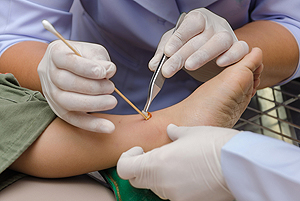Foot wounds are sores, cuts, or scrapes that can appear on the feet. If you have systemic conditions such as diabetes, peripheral neuropathy, or poor circulation, these wounds may heal slowly and poorly, resulting in potentially serious complications, from infection to amputation. If you notice a wound on your foot, you should protect the wound from bacteria immediately. Wash the wound thoroughly with clean water, then apply an antibiotic ointment. Cover the wound with a bandage, as leaving the wound open to air might allow bacteria to multiply on and infect the wound. Change the bandage and repeat this process every one to two days. Keep pressure off the wound by resting the affected foot. Your doctor may also suggest wearing specialized shoes or socks to offload pressure. If you have a foot wound, it is suggested that you seek the care of a podiatrist as soon as possible.
Wound care is an important part in dealing with diabetes. If you have diabetes and a foot wound or would like more information about wound care for diabetics, consult with Dr. Nicholas Przystawski from Central Florida Foot Care, PA. Our doctor will assess your condition and provide you with quality foot and ankle treatment.
What Is Wound Care?
Wound care is the practice of taking proper care of a wound. This can range from the smallest to the largest of wounds. While everyone can benefit from proper wound care, it is much more important for diabetics. Diabetics often suffer from poor blood circulation which causes wounds to heal much slower than they would in a non-diabetic.
What Is the Importance of Wound Care?
While it may not seem apparent with small ulcers on the foot, for diabetics, any size ulcer can become infected. Diabetics often also suffer from neuropathy, or nerve loss. This means they might not even feel when they have an ulcer on their foot. If the wound becomes severely infected, amputation may be necessary. Therefore, it is of the upmost importance to properly care for any and all foot wounds.
How to Care for Wounds
The best way to care for foot wounds is to prevent them. For diabetics, this means daily inspections of the feet for any signs of abnormalities or ulcers. It is also recommended to see a podiatrist several times a year for a foot inspection. If you do have an ulcer, run the wound under water to clear dirt from the wound; then apply antibiotic ointment to the wound and cover with a bandage. Bandages should be changed daily and keeping pressure off the wound is smart. It is advised to see a podiatrist, who can keep an eye on it.
If you have any questions, please feel free to contact our office located in Leesburg, FL . We offer the newest diagnostic and treatment technologies for all your foot care needs.

